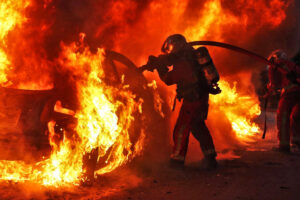With only days to go before the first round of the snap legislative elections called by President Emmanuel Macron, French politics remains as dramatically volatile as at any moment since the massive protests of 1968. A hung parliament, with the extreme Right National Rally holding the most seats but falling short of a majority, currently appears to be the most likely outcome of the législatives. But any number of scenarios are still possible, including some very dire ones.
Why such turmoil? While French economic growth has been sluggish since the pandemic, the country is not in recession, inflation has receded and unemployment has dropped since Macron took office. France has not experienced a major terrorist attack in recent years and faces no immediate international crises. Is this simply another example of grumpiness on the part of a people who, as the writer Sylvain Tesson put it, “live in paradise but think they’re in hell”?
The explanation is more complicated. Much of it, of course, goes beyond France itself, and relates to the global wave of populist discontent that first crested with Brexit and Donald Trump’s 2016 victory. In country after country, large numbers of voters, predominantly older, predominantly from outside major cities, feel abandoned and disrespected by their national elites, unprotected from what they perceive as gale-force economic and cultural change (exemplified above all by migration), and receptive to populist leaders such as the National Rally’s Marine Le Pen, who promise to bring back eras of past national stability and greatness. Anxieties prompted by the pandemic and war, the lingering pain of post-pandemic inflation and the outrage-intensifying effects of social media have all reinforced the trend.
But another part of the explanation comes from deep in French history. Since the Revolution of 1789, France’s political culture has been marked by an inordinate distrust of faction that has, again and again, crippled the development of a stable party system. In the United States, where the party system is paralytically stable, populist extremism could only succeed by capturing one of the two dominant parties. In France, Macron himself toppled the weak system that had prevailed for much of the history of the Fifth Republic, opening a breach through which Le Pen’s National Rally now threatens to sweep.
The birth of French democracy in the Revolution was marked by ideological strife accompanied by tragic, large-scale violence. But that very experience generated a desperate desire on the part of successive governments to transcend faction and restore national unity. Despite the country’s reputation for ideological passion, since 1789, genuine radicals have only held power for relatively short periods, such as during the Reign of Terror and Vichy. Otherwise, nearly all France’s regimes — republican, royal, and Bonapartist — have at least paid lip service to the idea of national cohesion. The historian Pierre Serna has gone so far as to characterise post-revolutionary French politics as a repeated return to what he calls the “extreme centre”. As often as not, this has been a politics focused less on ideology than on personality, from Napoleon and Louis-Napoleon Bonaparte to Charles de Gaulle.
When the Fourth Republic collapsed in 1958 amid the strife of the Algerian War, the new constitution put in place by and for de Gaulle included a powerful presidency that would, in theory, stand at a remove from partisan politics and serve as a focus of unity. De Gaulle reluctantly conceded that in order to campaign for the presidency and secure support in parliament, he could not do without a party of his own, but that party accommodated different ideological strains, and went through many incarnations, as shown by its comically frequent name changes (Union for the New Republic, Union of Democrats for the Republic, Rally for the Republic, Union for a Popular Movement, The Republicans).
Over time, the Gaullists did show signs of coalescing into a relatively stable centre-right movement, not hugely different from counterparts throughout Europe such as the West German Christian Democrats. Meanwhile, a relatively stable ideological opponent seemed to take shape in the Seventies after François Mitterrand forged a congeries of Left-wing groups into a new Socialist Party. (French socialists had earlier eschewed the label of party altogether, preferring to call themselves the French Section of the Workers’ International.) In 1981, Mitterrand’s election as president was hailed as proof that the Fifth Republic had finally become an ordinary Western democracy, with regular alternation between Left and Right parties. The dominance of the Gaullists and the Socialists was especially pronounced on the local level, where each built up powerful organisations.
On a national level, however, the party system remained relatively weak, with both the Gaullists and Socialists divided into competing “currents”, and with a constantly shifting constellation of smaller parties nipping at their heels. In theory, the Fifth Republic’s mandatory two-round election system should have helped the major parties, since they had the greatest strength for prevailing in the second, run-off round of both presidential and parliamentary votes. In practice, it turned the first round into repeated opportunities for cost-free protest, in which discontented electors voted their “hearts rather than their heads”, giving unexpected support to extremists including, especially, Le Pen’s father Jean-Marie. Already in the 1988 presidential election, Le Pen senior managed to score more than 14% in the first round, just two points behind a respected centrist former prime minister. Fourteen years later, he shocked the political world by edging ahead of a Socialist and winning a place in the run-off against incumbent Gaullist Jacques Chirac (which he lost massively).
In this century, the party system grew even weaker for several reasons. For one thing, a well-meaning constitutional reform set both the presidential and parliamentary terms at five years (the presidential one had previously been seven), in order to reduce the possibility of “cohabitation”, or split government between the executive and legislative branches. It succeeded in doing so, but at the cost of increasingly turning parliamentary majorities into personal ones, tied to the incumbent president rather than a party. Meanwhile, Marine Le Pen took over the party then called the National Front from her father and began a concerted campaign to “de-demonise” it, notably by renouncing his notorious antisemitism and actively cultivating Jewish support. (This year, the Nazi hunter Serge Klarsfeld has announced he will vote for the National Rally.) Her vote totals steadily rose, and in the last two presidential elections she made it into the run-off round against Macron, scoring an astonishing 41% in 2022. It also helped that an even more extreme party, “Reconquest”, emerged to her Right, allowing her to play the moderate. In the 2022 legislative elections, the National Front gained the largest number of deputies of any far-Right party since the late 19th century.
But the largest blow to the party system came with the disastrous presidency of Socialist François Hollande and the rise of his successor, Macron. At first, Hollande’s defeat of incumbent neo-Gaullist Nicolas Sarkozy in 2012 seemed like another successful “alternation”. But Hollande quickly faced a perfect storm of calamities: an embarrassing personal scandal over his affair with an actress; a string of horrific Islamist terrorist attacks; the ongoing European debt crisis; and large-scale protests against his proposed labour and pension reforms. By late 2016, one poll placed his approval rating at an humiliating low of just 4%.
The presidential election that took place a year later went a long way towards exploding the system altogether. Hollande’s ambitious former economics minister Macron declined to run as either a Socialist or neo-Gaullist, and instead created his own centrist political party. It was an entirely personal vehicle — no coincidence that its initial name, “En Marche”, had the same initials as the candidate. Amid the wreckage of the Hollande presidency, in the first round Macron managed to whip past both neo-Gaullist François Fillon and Socialist Benoît Hamon, who scored just 6%, thanks in large part to competition from Left populist Jean-Luc Mélenchon who had founded yet another new party, France Unbowed (La France Insoumise). In the second round Macron easily defeated Marine Le Pen. And then, in the legislative elections that immediately followed, his party (now called “La République en Marche”) won a convincing majority.
Since Macron’s election, French politics has again been very much an affair of personality — his — more than ideology. Both the Socialists and the neo-Gaullist Republicans remain in dire straits, the former wrestling for support with Mélenchon’s party, the latter desperately trying to stanch the bleeding of their support to Le Pen. The Socialists even had to sell off their Parisian headquarters. Macron himself, despite his objectively reasonable economic record, has alienated voters on all sides with his remarkable aloofness and arrogance. Anger especially boiled up in the spring of 2023 when, lacking a parliamentary majority to pass a hugely unpopular pension reform, he resorted to constitutional fiat (“article 49.3”). His approval level, while not yet at Hollandian depths, now stands at just 24%. In the recent European election, the National Rally list, led by Marine Le Pen’s charismatic 28-year-old protégé Jordan Bardella, became the chosen instrument with which the French would vote their disapproval of Macron. The Republicans have now split, with part of them willing to take part in a National Rally government.
Can the National Rally translate the upsurge of protest into a parliamentary majority? In recent days, Macron’s party (now rebranded yet again as Renaissance) has rebounded somewhat in the polls, while the various Left parties have joined into a “New Popular Front” in the hopes of blocking the extreme Right. But the situation remains enormously uncertain.
A hung parliament could actually be a worse outcome than a National Rally victory. Macron, in taking the gamble to dissolve parliament, clearly thought that bringing the far-Right into government, where he could check it with his presidential powers and heap on it the blame for everything that goes wrong, might actually help keep Le Pen from the presidency in 2027 (Macron himself cannot run again due to a constitutional term limit). But if no group gets a majority in the législatives, and Macron’s own party ends up wiping out, the pressure on him to resign, forcing a new presidential election, might become irresistible. For the moment, Macron has said he will remain in office until 2027, “come what may”. But can he keep that promise? If not, France’s long pursuit of national unity and the “extreme centre” may falter, and a government of the extreme Right could come to power sooner than anyone expected.
Disclaimer
Some of the posts we share are controversial and we do not necessarily agree with them in the whole extend. Sometimes we agree with the content or part of it but we do not agree with the narration or language. Nevertheless we find them somehow interesting, valuable and/or informative or we share them, because we strongly believe in freedom of speech, free press and journalism. We strongly encourage you to have a critical approach to all the content, do your own research and analysis to build your own opinion.
We would be glad to have your feedback.
Source: UnHerd Read the original article here: https://unherd.com/



